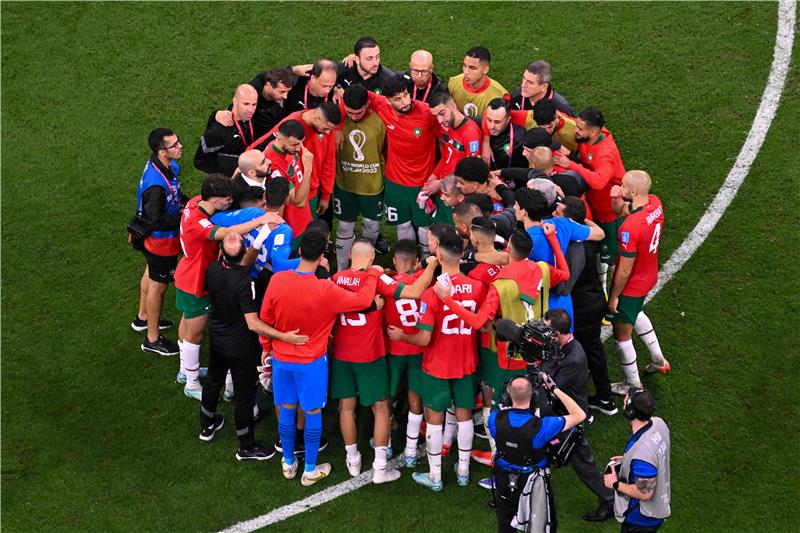It was Senegal’s year in the African football arena as they finally conquered the Africa Cup of Nations, but their achievements overshadowed by Morocco’s barnstorming run to the World Cup semifinal.
What many predicted might be another horror year for the African game, turned into anything but at the World Cup in Qatar as Morocco became the first African country to reach the last four.
Senegal also went through to the second round as Africa made up for the disappointment of not getting a single team past the first round in Russia in 2018.
Although Cameroon, Ghana and Tunisia did not advance they were all close with Ghana losing a decisive game to Uruguay while the Indomitable Lions left the tournament despite upsetting Brazil and Tunisia handing defending champions France a 1-0 defeat in the group phase.
Morocco had been the most convincing of the teams to come through the qualifiers, which were concluded in March when the 10 group winners from 2021 were paired into five playoff ties.
There were upset defeats for Algeria, who conceded a last gasp goal at home to Cameroon to miss out on Qatar, and Nigeria, edged by Ghana on the away goals rule after a goalkeeping howler.
Senegal narrowly edged Egypt on post-match penalties to book their place at a second successive World Cup tournament after a two-legged stalemate, which came only six weeks after edging the Egyptians on penalties as well to win the Cup of Nations.
Senegal lived up to their pre-event billing as favourites although it was by no means a convincing triumph for the continent’s top ranked team.
But their success will forever have the stain of the deadly stadium stampede that overshadowed the troubled tournament and condemned Cameroon to one of the worst continental championships in decades.
The deaths of eight people, with a further seven seriously injured, came as a result of poor organisation, lax security controls and general dereliction of duty.
This was an event that came close to being cancelled less than a month before kickoff because of concerns over Cameroon’s hosting ability, which were then realised in horrific tragedy.
Yaounde’s newly-built Olembe Stadium, where police stood idly by while a surge of spectators attempted entry into the ground causing a crush, was still being hastily completed days before the kick off of the tournament, itself twice delayed by Cameroon’s failure to be ready and then the Covid pandemic.
A barely playable pitch saw the other showpiece new stadium in Douala prematurely shut in another embarrassing setback and there were a litany of tales about poor training facilities, inadequate accommodation and severe food poisoning that hit two sides staying at the same hotel.
The folly of Zambian referee Janny Sikazwe twice blowing short a key early match between Mali and Tunisia also rained down ridicule and there were some overzealous red cards and VAR referrals.
But it would be disingenuous to write off Cameroon 2021 as a disaster. The first week of football produced a bizarre sequence of 1-1 scorelines but then came intriguing twists and turns, highlighted by some fairytale shocks that brought the competition to life and will have put to bed the argument that a 24-team tournament means too many mediocre matches.
At club level, Wydad Casablanca won a third African Champions League as they ended a record-breaking bid by Egypt’s Al Ahly in the final and at the end of another tournament mangled by administrative machinations.
The choice of Casablanca to host the one-off final was clouded in Machiavellian deceit and prove another example of the Confederation of African Football shooting itself in the foot without provocation.
This was the third Champions League final to be decided at a neutral venue after CAF changed from the tried and tested format of a two home-and-away legs in a bid to replicate the success of their Uefa equivalent.
But the contrast with Europe in terms of fan travel and resources are stark and bidding by African cities to host the final has not proven plentiful, in contrast the wide array of options European football’s controlling body have annually.
While Uefa decide on the venues of its European club competition finals well in advance, CAF left the decision until the Champions League was already at the semifinal stage – just three weeks before the final when it was already clear that Al Ahly and Wydad would contest the final.
CAF claimed Morocco were the only football association to bid for the match after Senegal withdrew but the truth is Casablanca and Dakar were both on the table and a vote of the CAF executive committee gave it to Morocco despite the fact there were two Casablanca teams in the Champions League while none from Senegal, making Dakar the perfect neutral venue.
Predictably the Egyptians were up in arms about having to play the final in Wydad’s back yard and took the matter to the Swiss-based Court of Arbitration for Sport but had their appeal dismissed.
“I suppose the powerful got what they wanted in the end,” said a bitter and sarcastic Ahly coach Pitso Mosimane after his side lost 2-0 in the final and in a reference to Morocco’s considerable sway on the African game. Casablanca’s Mohamed V did deliver an extraordinary one-sided atmosphere with the 12th man factor proving considerable as Wydad won, thereby denying Ahly the distinction of becoming the first club to take the Champions League three years in a row.
Source: supersport.com

